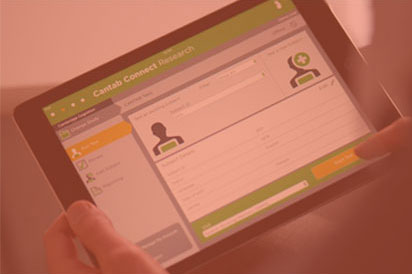Cambridge Cognition Holdings plc (LON:COG), a technology company which develops and markets patient-focused solutions to better assess brain health, has announced its unaudited preliminary results for the year ended 31st December 2021.
Highlights
The Company delivered a strong performance in 2021 with revenue growth of 50% and a record sales order intake for the second year running. These results are due to the successful execution of the Company’s strategy to commercialise a broader product set of digital outcomes assessments for clinical trials. Uptake of these assessments has increased during the COVID-19 pandemic with a step-up in virtual clinical trials and at-home measurements that we expect to continue. The Company was profitable over the year while continuing to invest in new solutions for growth in the future.
Financial summary
· Revenue up 50% to £10.1m (2020: £6.7m)
· Gross profit up 49% to £8.1m (2020: £5.4m)
· Profit for the year £0.5m (2020: £0.4m loss)
· Earnings per share 1.4 pence (2020: 1.5 pence loss per share)
· Cash balance of £6.8m at 31 December 2021 (31 December 2020: £3.0m)
Operational highlights
· Record sales order intake of £15.7m (2020: £12.7m)
· Major contract wins, including a £2.3m large cohort study
· Contracted order book £17.0m at 31 December 2021 (31 December 2020: £11.2m)
· Well-managed growth leading to profitability
· Proprietary speech technology for clinical trials in validation trials
· Completed spin-out of digital phenotyping business, Monument Therapeutics
Commenting on the results, Matthew Stork, Chief Executive Officer, said:
“We are delighted to have delivered above-market growth and a profitable year of trading. The demand for digital outcomes assessments for clinical trials is forecast to continue to grow. With these tailwinds, we have evolved our strategy and plan further investment in developing digital biomarkers and corporate business development, as well as continuing with a focus on commercial execution. We believe we are well placed for more success in 2022 and beyond.”
CHIEF EXECUTIVE’S REVIEW
Overview
2021 has been a landmark year and inflection point for the Company. With considerable momentum from successes in 2020, the Company delivered record sales, 50% revenue growth, and profitability in 2021. I am grateful to both the investors who have supported us and our team for their commitment and hard work as we have grown the business.
Cambridge Cognition’s goal is to improve the health of people around the world by discovering and delivering more effective brain health assessments. The Company’s leading computerised cognitive assessment, CANTABTM, was developed with this in mind at Cambridge University. We have subsequently built upon that position with a suite of in-clinic and home-based digital and verbal cognitive tests and electronic Clinical Outcomes Assessment (“eCOA”) instruments.
We have continued to focus on commercial execution to drive sales of our innovative solutions for clinical trials. At the same time, there has been increased demand with an acceleration of the trend towards virtual clinical trials and more investment in Central Nervous System (“CNS”) drug development. These dynamics resulted in substantial orders and subsequent revenue growth for both our software and services. We consistently provided value for our loyal and growing customer base of leading academics, top 20 pharmaceutical and biotech companies.
There were some more delays to clinical trials due to the pandemic in 2021 – fewer than in 2020 – and once again the impact on revenues were offset by new contract gains. With our experience in, and infrastructure for, web-based assessment we were able to support customers with at-home-measurement as part of a virtual or hybrid clinical trial.
In addition to delivering a strong performance in 2021, the contract wins over the year mean we are well prepared for 2022 and beyond with a contracted order book of over £17 million at the start of 2022, of which at least £7.5 million is expected to be recognised as revenue in 2022, subject to customer delivery schedules. This gives the Company excellent visibility of revenue into the year ahead.
Cambridge Cognition has a reputation for leading in the development of novel digital cognitive assessments. This is evident from the widespread use of CANTAB™ amongst the academic research community, the leading members of which frequently advise pharmaceutical companies on clinical trial design. The evidence for CANTAB™ continues to build and there are now over 2,500 publications of studies across over 100 therapeutic areas. We were also pleased with the progress made developing and publishing on new short, high frequency cognitive assessments on mobile phones.
We took a major step forward in 2021 with considerable scientific communication on our proprietary speech technology, NeuroVocalixTM, a fully automated voice platform that is being specifically developed for clinical trials. Over the year, we completed the platform product development, moving it from an R&D environment to our regulatory compliant production environment, and are working on verbal assessments for the platform and validation clinical trials.
Our strategic focus on clinical trials saw us finalise the spin-out of a digital phenotyping business, Monument Therapeutics, retaining a minority shareholding and the potential for royalties in the future.
Financial Results
Revenue grew by 50% to £10.1m (2020: £6.7m). Revenue is recognised over the term of the contracts and so the £10.1m revenue recognised in 2021 was from contracts won both in 2021 and in prior years.
We anticipate the £17.0m contracted orderbook at the end of December 2021 will generate at least £7.5m of revenue to be recognised in 2022 with the balance to be recognised in subsequent years.
Recognised revenue split by type was as follows:
| 2021£m | 2020£m | Increase£m | Increase | |
| Software | 3.6 | 2.7 | 0.9 | 33% |
| Services | 5.6 | 3.7 | 1.9 | 51% |
| Total Software & Services | 9.2 | 6.4 | 2.8 | 44% |
| Hardware | 0.9 | 0.3 | 0.6 | 300% |
| Total Revenue | 10.1 | 6.7 | 3.4 | 50% |
Services revenue grew by 51% as more implementation and bespoke development work was carried out. Software revenue improved by 33% but, given the time lag between contract signature and software usage, we would expect this to grow further in 2022.
Hardware sales have increased considerably as a percentage of revenue in 2021; the hardware, which is procured from third parties, is only supplied by Cambridge Cognition when specifically requested by a customer to support a project. Hardware sales had been expected to decline as digital devices become ubiquitous, however, we now integrate wearable devices into our solution and so increased the supply of these in 2021.
Gross profit was £8.1m (80.2% margin) compared with £5.4m (80.4% margin) in 2020. The additional spending on hardware was offset by a reduction in third party costs.
Administrative expenses increased by 28% to £7.8m (2020: £6.1m) primarily as a result of an increase in headcount post the COVID-19 recovery, which accounts for £1m of the increase. The remainder is due to increased legal, professional and third-party services costs.
As planned, investment in research and development, which is necessary to maintain the company’s position at the forefront of the sector, was more targeted in 2021 and this resulted in R&D spend of £1.7m (2020: £1.5m).
Profit before tax was £0.3m (2020: loss before tax £0.6m). R&D tax credits were £0.2m (2020: £0.2m). The post-tax profit for the year was £0.5m (2020: post tax loss £0.4m), which equates to earnings per share of 1.4 pence (2020: 1.5 pence loss per share).
Cash inflow from operating activities was £3.9m (2020: £1.0m), driven by the high value of sales orders. Sales contracts for clinical trials typically include an amount of cash billable upon signing, and as such an invoice is raised (and cash subsequently collected) as contracts are executed and before revenue is recognised.
After investing activities total cash inflow was £3.8m, and the year-end cash balance was £6.8m, which provides a solid platform for growth (31 December 2020: £3.0m).
Operational Review
Cambridge Cognition had a productive year in 2021, progressing major contracts and achieving a number of milestones, while carefully managing costs. The achievements spanned winning sizeable new contracts, improving the company’s brand position, continuing innovative developments, and spinning-out a drug development business.
Record sales order intake. Our commercialisation activities resulted in record sales orders of £15.7m in 2021. There were three main contributors: first, with excellent customer service – seen in survey responses – we routinely see clients contracting multiple times over many years; secondly, we have been targeting new therapeutic areas with the potential for increasing use of cognitive assessments; and thirdly, we have been continuing to lead with new solutions and so increased average order values for clinical trials by 30%.
Large contract wins. As announced, to maintain visibility for investors, we won several large multi-year contracts: £2.9m in contract value for several schizophrenia trials, a £0.5m contract for at-home testing, £1.4m for digital health and wearables, a £2.2m contract for a large cohort study, a £1m contract for a late phase cancer trial, and £0.5m for a non-CNS eCOA study.
Leading brand position in the scientific community. As leaders in cognitive assessment, Cambridge Cognition continued to hold a prominent position in the scientific community over 2021. This included presenting cutting-edge data at more than 20 conferences around the world and writing our own and supporting pharmaceutical companies to author papers using data from our assessments. We collaborated with leading pharmaceutical companies, such as Novartis, to present as well. We also secured more research partnerships with prestigious consortia, such as the BrainHealth Registry.
Proprietary speech technology for clinical trials productised and being validated. Verbal neuropsychological tests are highly sensitive to the early signs of neurodegeneration in older adults. However, their dependence on in-person testing and manual scoring means they are costly and can be unsuitable for large-scale screening and home-based monitoring. To address this, Cambridge Cognition developed a fully automated voice platform, NeuroVocalix™. In 2021, we completed its productisation, setting the Company up with the potential to serve more customers with a proprietary platform capable of automating the delivery and scoring of key cognitive assessments for clinical trials within the security requirements of this highly regulated industry. We are working on a battery of tests and validation trials with two leading universities; these are essential to fully commercialise the solution.
Completed spin-out of digital phenotyping business. Having won a sizeable grant to investigate digital phenotyping, we incubated a new business, raised seed funding and spun it out. Monument Therapeutics is now operating as a wholly independent business with a licence from Cambridge Cognition. The initial shareholding was diluted by additional fundraising by Monument Therapeutics to extend their runway before a Series A investment round. Upon successful commercialisation of Monument Therapeutics’ drug development programmes, Cambridge Cognition will be paid royalties.
Strategic Review
Cambridge Cognition serves a niche, high value requirement for CNS outcomes assessments with differentiated software and services offerings with intellectual property protection. Our strategy is to focus primarily on the clinical trials market as the assessments can be used to demonstrate the efficacy or safety of a potential new therapeutic agent and therefore provide extremely valuable information for a pharmaceutical or biotech company. We also serve the healthcare and academic markets, direct in some markets and via distributors in others.
We expect the dynamic market for clinical trial outcomes assessments to continue to evolve rapidly. We are seeing several favourable trends that could continue well into the future:
· Market growth is predicted to be 17%1 and 30%2 for the eCOA market and the cognitive outcomes assessment market for clinical trials respectively.
· There has been a pre-existing gradual trend away from ‘pen-and-paper’ questionnaires administered by clinicians or raters in clinical trials towards objective digital measures, whether in clinic or at home. More recently, this has been overtaken by the requirement for digital measurements at home.
· The COVID-19 pandemic reduced access to clinical trial sites and accelerated the adoption of virtual or hybrid clinical trials, with a 50% increase compared to 20203. Virtual assessments enable patients to participate in clinical trials from home and can be more cost-effective, inclusive and representative.
· Industry is increasingly investing in CNS drug development. In 2021, pharmaceutical companies sponsored the delivery of more than 850 CNS trials, up 10% on 20204. This investment is set to continue in 2022 and beyond with more than 1,800 neurological products in preclinical development4.
· Investment in new digital biomarkers for many conditions and symptoms, sometimes from an existing or new digital assessment or wearable device and sometimes combining data from multimodal sources.
During the second half of 2021, having delivered much of the strategy set in 2019, we conducted a major review and have set out plans for the next phase of growth. The areas of focus are:
1. Increasing market share and sales of cognitive assessments and eCOA solutions with proactive preparation of new assessments, increased sales and marketing capacity, and commercial distribution agreements for new territories and market sectors.
2. Developing new intellectual property to serve the evolving demands of the industry for digital assessments and biomarkers. The potential for these is considerable with hundreds of clinical trials already using pen-and-paper cognitive assessments that could be automated. Our primary programme is our voice-based cognitive assessment solution, NeuroVocalix™. We are also completing a battery of quick assessments for use on mobile phones. We are developing these in-house and validating them with leading academic institutions and major pharmaceutical companies.
3. Pursuing opportunities for inorganic growth through corporate development activities, such as partnership and licensing-in software and/or services. As is normal after an early stage of widespread investment in a new field, there have been some acquisitions in the sector and further consolidation is likely in the longer-term. Against this backdrop, in 2022 and beyond we will review our inorganic growth options by evaluating complementary products and services that could increase the breadth of our offering and gain scale efficiencies. We have a leading position in our core business area, a strong platform and a robust balance sheet to support corporate business development.
Importantly, to achieve these strategic goals, we are carefully managing our investment and growth. We have several underlying enabling activities:
1. Having an outstanding team. We are supporting our existing team and recruiting people to implement the new contracts we are winning and also to complete the projects outlined above. Recruitment has lagged delivery slightly in this difficult market for hiring though we are making progress.
2. Upgrading our systems and protecting against cyberattacks. We are working on moving – we are live in one country – to Amazon Web Services (AWS) to have more flexible server capacity and access to more microservice usage. We continue to run a full cybersecurity programme.
3. Enabling efficient growth. For example, we set out and have now implemented a plan to open a software development unit in a lower cost overseas country. This will over time reduce our costs while increasing output.
We have started implementing this new strategy and the enabling activities in order to make further progress in 2022.
COVID-19
Throughout the pandemic, our priority has been the safety and welfare of our staff, people in our local environment, suppliers and customers. The Company has cloud-based systems and has been fully operational throughout, working virtually at times.
We have seen an acceleration of interest in virtual and hybrid clinical trials. Orders for at-home testing with our cognitive assessments have grown rapidly. We have leveraged a publication that showed that our most popular cognitive assessments provide the same results at home as they do in the clinic6.
At the start of the pandemic, many clinical trials were delayed. This was less the case in 2021 compared to 2020. We do expect this to reduce over time. Uncertainty persists, however, and so we will continue to carefully monitor the situation and adjust plans as necessary.
Russia & Ukraine
The war in Ukraine is a concern for all and our thoughts are with those affected. We have no employees or service providers that are based in Ukraine or Russia. However, although based elsewhere, a small number of the Company’s pharmaceutical and academic clients run trials at sites in these countries. We continue to communicate with affected customers, monitor the situation, and do all we can to support them.
We have a few direct customers in the region, all academic centres that use our academic solution, and have halted any new contracts with Russian centres at this time. This has had no effect on the Company’s current revenues.
Board and Management Changes
Two appointments have been made to the Company’s senior management team post period end in April 2022. Stephen Symonds has joined as Chief Financial Officer and is expected to be appointed to the board in due course. Nick Walters, previous CFO who has provided transition support since the departure of Michael Holton, is now handing over to Stephen. The Board wish both Nick and Michael well in their future endeavours. Francesca Cormack was appointed to be Chief Scientist to oversee our science leadership and research & development and Jenny Barnet, Chief Science Officer, will step down to concentrate on leading our spin-out, Monument Therapeutics.
Outlook
We made excellent progress in 2021, delivering strong growth in orders, revenues and cash generation, together with moving into profitability and earnings ahead of market expectations. Furthermore, with a strong contracted order book providing excellent visibility of revenue through 2022 and well-beyond, we expect the company is well placed for further success. There does remain some uncertainty due to COVID-19 and the wider impact of the war in Eastern Europe, though these are considered limited at this time.
We have set out three growth strategies to expand market share in current markets, automate more assessments as demand increases for virtual clinical trials and seeking corporate business development opportunities. Each of these represents exciting growth opportunities for Cambridge Cognition.
With this clear growth strategy, together with a substantial pipeline of opportunities in an expanding market, leading market position and strong balance sheet, we believe Cambridge Cognition is positioned to deliver substantial, sustainable shareholder value in 2022 and beyond.
Matthew Stork
Chief Executive Officer
12 April 2022
References.
1. GrandView Research 2018 eCOA Report 2018-20225
2. Astute Analytica. 2021. US Cognitive Assessment Market. 2017-2027.
3. TrialTrove (accessed 15.02.2022)
4. Clinical Trials Arena, Analysis December 2021, 2022 forecast decentralised trials to reach new heights with 28 percent jump
5. PharmaProjects (accessed 15.02.2022)
6. www.jmir.org/2020/8/e16792








































